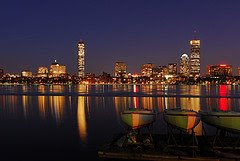First impression of Boston is how tranquil the town is—calm, nice with people being thoughtful. Interestingly, Boston lacks the level of intensity that is perpetually pushing people to the limits of sanity as in New York. The presence of having to attack, having to compete, having to work together, having to be paranoid that is part of New York is devoid in the Bostonian as I walked through Copley Square and Beacon Hill.
What is quite surprising is how much private high-school permeates Boston life. The world of private school in New Jersey is really for those who suffer from a severe case of inferiority. New Jersey invest heavily in its public schools and boasts the best in the nation, with little reason for a family living in a good town to pay the added expense.
However, that is not the case in Boston. A street is called Exeter; another called Dartmouth, a beneficiary of the private schools that dot the states from Connecticut heading northward.
Overtime, one has to question if this pervasiveness is a breakdown between the citizenry and local government that has now gone on for generations–the pride of being from Exeter and heading on to one of the schools that makes up such an important part of Boston life. The preppy clothes–some wearing new and neat, others wearing Polo shirts hanging sloppily around their overly wide waists, a sign of inactivity. And the whiteness, Oh! the whiteness. Not of the clothes, but of the skin. Pale white faces; paler white legs. And the look, Oh! the look. That pale white face with the look of inbreeding. America’s version of the royal family. A person so pale and so soft that a simple look from someone from South Boston or from an area like Bensonhurst would make this soft, fleshy boy in his twenties collapse due to his sheltered, shallow existence having lived a life in walled gardens.
The softness is distant from the lives most Americans and others around the world live. The coarseness that one builds up from watching their parents struggle to makes ends meet–the lack of money for your mom to look as pretty as she wants; the stress dad feels from always having his job threaten in this American system build around business. The white, pale soft skin of the Bostonian, descending from a father that works for the private equity firm that bought the company your dad who used to work for, then fired so they could afford to pay down the debt piled on to purchase it.
The southy driving the tour bus demanding his paying customers to listen: “If you listen, you’ll learn something.” Or, the other southy, owner of a liquor store, forcing the pale college student to dig deep into his pockets to find the final penny to pay his tab. The elder statements of the liquor store with a reddened face followed the pale student, he was not required to dig deep into his pockets to find his last penny.
The softness at first can be nice. The parents, now empty nesters, together, having wine in an French Bistro on Newbury Street. But, after a few minutes, there is no conversation. She has wine and her crossword puzzle. Always an ideal spot to do a crossword puzzle–a happening bistro in one of the trendiest cities in the country. This couple likely said goodbye to their last child. The husband, to have some conversation, turned to the early twenty-something barmaid. Her ambitions were not to be barmaid—to no one’s surprise—but to help her boyfriend turn his streaming radio station into a success. At least the barmaid still had hope. The wife, suffering the numbness associated with her daily in-take of wine and lack of physical exertion, turned back to her crossword puzzle.
What was not picked up in my first day of Boston was what made Boston great—the intelligence that comes from attracting many of the best minds in the world. The philosophy that helped drive the creation of laws that this nation was built on and the men and women of science who continually come up with the new ways to approach life that allow human beings to move forward. Well, tomorrow is another day.


 Follow
Follow